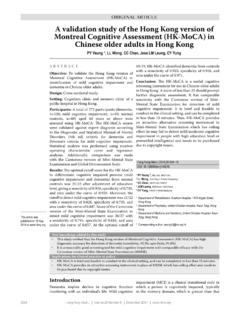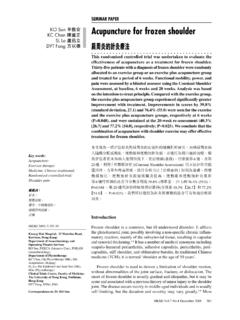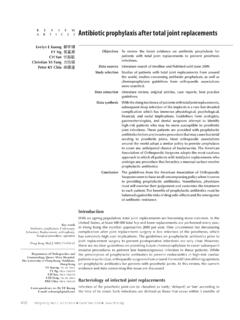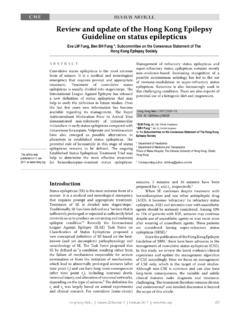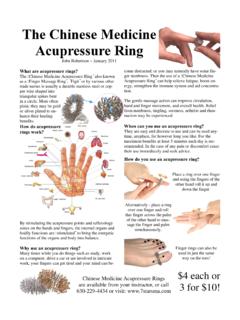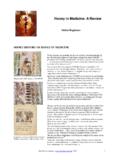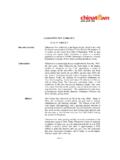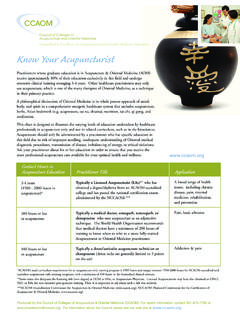Transcription of A validation study of the Hong Kong version of Montreal ...
1 504 Hong Kong Med J Volume 20 Number 6 December 2014 Objective: To validate the Hong Kong version of Montreal cognitive assessment (HK-MoCA) in identification of mild cognitive impairment and dementia in chinese older : Cross-sectional : Cognition clinic and memory clinic of a public hospital in Hong : A total of 272 participants (dementia, n=130; mild cognitive impairment, n=93; normal controls, n=49) aged 60 years or above were assessed using HK-MoCA. The HK-MoCA scores were validated against expert diagnosis according to the Diagnostic and Statistical Manual of Mental Disorders (4th ed) criteria for dementia and Petersen s criteria for mild cognitive impairment.
2 Statistical analysis was performed using receiver operating characteristic curve and regression analyses. Additionally, comparison was made with the Cantonese version of Mini-Mental State Examination and Global Deterioration : The optimal cutoff score for the HK-MoCA to differentiate cognitive impaired persons (mild cognitive impairment and dementia) from normal controls was 21/22 after adjustment of education level, giving a sensitivity of , specificity of , and area under the curve of Moreover, the cutoff to detect mild cognitive impairment was 21/22 with a sensitivity of , specificity of , and area under the curve of Score of the Cantonese version of the Mini-Mental State Examination to detect mild cognitive impairment was 26/27 with a sensitivity of , specificity of.
3 And area under the curve of At the optimal cutoff of A validation study of the Hong Kong version of Montreal cognitive assessment (HK-MoCA) in chinese older adults in Hong KongIntroductionDementia implies decline in cognitive function interfering with an individual s life. Mild cognitive New knowledge added by this study This study verified that the Hong Kong version of Montreal cognitive assessment (HK-MoCA) has high diagnostic accuracy for detection of dementia (sensitivity, ; specificity, ). It is a reasonably good screening tool for mild cognitive impairment with comparable efficacy with the Cantonese version of Mini-Mental State Examination (MMSE).
4 Implications for clinical practice or policy HK-MoCA is brief and feasible to conduct in the clinical setting, and can be completed in less than 15 minutes. HK-MoCA provides an attractive screening instrument in place of MMSE which has ceiling effect and needs to be purchased due to copyright Kong Med J 2014;20:504 10 DOI: Yeung *, LL Wong, CC Chan, Jess LM Leung, CY Yung1 PY Yeung *, MB, ChB, MRCP (UK)2 LL Wong, FHKCP sych, FHKAM (Psychiatry)3 CC Chan, MRCP (UK), FHKCP 2 JLM Leung, MRCP sych, FHKCP sych3 CY Yung, FHKCP, FHKAM (Medicine)1 Department of Rehabilitation, Kowloon Hospital, 147A Argyle Street, Hong Kong2 Department of Psychiatry, United Christian Hospital, Kwun Tong, Hong Kong 3 Department of Medicine and Geriatrics, United Christian Hospital, Kwun Tong, Hong Kong* Corresponding author.
5 Article was published on 15 Aug 2014 at (MCI) is a clinical transitional state in which a person is cognitively impaired, typically in the memory domain, which is greater than that ORIGINAL ARTICLE18/19, HK-MoCA identified dementia from controls with a sensitivity of , specificity of , and area under the curve of : The HK-MoCA is a useful cognitive screening instrument for use in chinese older adults in Hong Kong. A score of less than 22 should prompt further diagnostic assessment . It has comparable sensitivity with the Cantonese version of Mini-Mental State Examination for detection of mild cognitive impairment.
6 It is brief and feasible to conduct in the clinical setting, and can be completed in less than 15 minutes. Thus, HK-MoCA provides an attractive alternative screening instrument to Mini-Mental State Examination which has ceiling effect (ie may fail to detect mild/moderate cognitive impairment in people with high education level or premorbid intelligence) and needs to be purchased due to copyright issues.# Hong Kong version of Montreal cognitive assessment # 505 Hong Kong Med J Volume 20 Number 6 December 2014 HK-MoCA 272 60 130 93 49 HK-MoCA Petersen HK-MoCA HK-MoCA 21/22 21/22
7 26/27 18/19 HK-MoCA HK-MoCA HK-MoCA 22 HK-MoCA HK-MoCA 15 HK-MoCA expected for a person at the given age and education level. A longitudinal study revealed that MCI patients proceeded to overt dementia at a rate of 10% to 15% per year, compared with a rate of 1% to 2% in control This implies that MCI patients have high risk of progressing to dementia. Prevalence of MCI varies widely, depending on the diagnostic criteria used and population studied.
8 Its prevalence ranges from 3% to 13% in people above 65 years of Hence, identification of MCI patients is important for successful implementation of preventive strategies and early interventions. In practice, cognitive screening tools are used to detect persons with cognitive impairment who then undergo a detailed assessment process to ascertain the subtype, severity, caregiver status, and the presence of behavioural and psychological symptoms of dementia. The Mini-Mental State Examination (MMSE) is the most widely used screening tool introduced by Folstein et al in It was originally designed for screening Alzheimer s disease and does not encompass all cognitive deficits.
9 It has several well-known drawbacks, including low level of task difficulty, likelihood of ceiling effects (ie may fail to detect mild/moderate cognitive impairment in people with high education level or premorbid intelligence), and narrow range of cognitive domains assessed. Consequently, it has low sensitivity for MCI patient detection. The Cantonese version of Mini-Mental State Examination (CMMSE) was translated and validated by Chiu et al in 19944 with good sensitivity ( ) and specificity ( ) to discriminate subjects with moderate-to-severe dementia from normal subjects.
10 The Montreal cognitive assessment (MoCA) is a brief and potentially useful screening tool developed and validated by Nasreddine et It was conceptualised in MCI patients performing within a normal range on the MMSE. The MoCA is a one-page test with a maximum score of 30. One point is added if the person has 12 years of education or less. A score of 23 to 26 represents MCI, 17 to 22 represents moderate impairment, and 16 or below represents severe impairment suggesting The original validation study of MoCA reported a sensitivity of 100% and specificity of 87% in detecting mild Alzheimer s disease using a cutoff score of 26.

